794 Search Results for praactical teaching
September 2, 2012
by Carole Zangari -
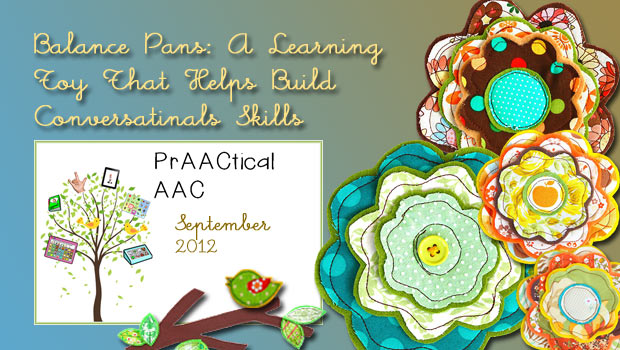
We’ve been thinking a lot lately about the social skills of some of our AAC friends who are not quite fitting in the way that they would like. SLPs frequently work on social interaction skills with learners on the ASD spectrum, but it’s not something that we always think about with learners who have cerebral palsy, apraxia, or other developmental disabilities. – The idea of using a balance scale as a metaphor for balance in conversational turns is intriguing and one we’ve explored a bit. In this video from Autism Teaching Strategies, Joel Shaul demonstrates the strategy and discusses it relative to turn-taking (Click here for Part 1 and click here for the second video). That makes sense for a lot of learners who don’t respond to non-obligatory situations as well as they could. – We’ve also used it for helping people with AAC see how their utterances compare to... [Read More...]
August 5, 2012
by Carole Zangari -

Cohesion is a tough concept for many of our learners who are developing their AAC skills and struggling to build relationships. In this week’s featured video, Joel Shaul, from Autism Teaching Strategies, discusses how to use two metaphors for building cohesive conversations. One is the idea of links in a chain and the other is the girders of a building. Of course, we are big fans of the use of visual supports whenever we talk and teach. — Although the focus here is learners with ASD, we’ve used this and similar strategies many kinds of learners. Hope you enjoy this informative video. – – – –
August 1, 2012
by Carole Zangari -
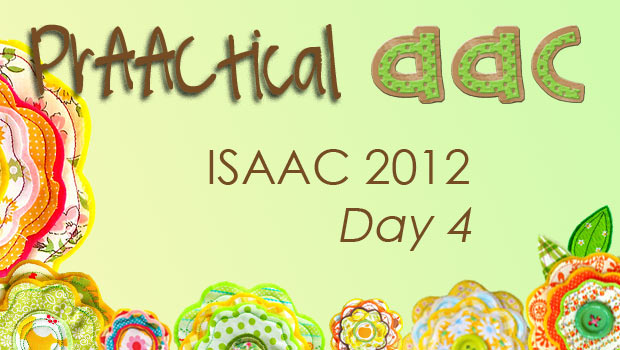
Lots more ISAAC fun to tell about in Day 4! — My day started with a shorter version of the presentation on the preschool core language curriculum that I’m working on with Lori Wise. You can see the handout for that presentation here. — There is some fascinating work going on in the area in supporting the emotional development of children with AAC needs. Dr. Sarah Blackstone and colleagues talked about the developmental sequence in which emotional competence emerges. They are working on an observation and interview tool used to collect information on a child’s emotional development and the caregiver strategies. They are planning a pilot study with the tool they are developing and actively looking for volunteers to use this tool with children who are developmentally between 12 months and 10 years. – Terry Foss and and Jane Korsten did an interesting presentation called Promptology 101 where they reviewed some... [Read More...]
July 31, 2012
by Carole Zangari -
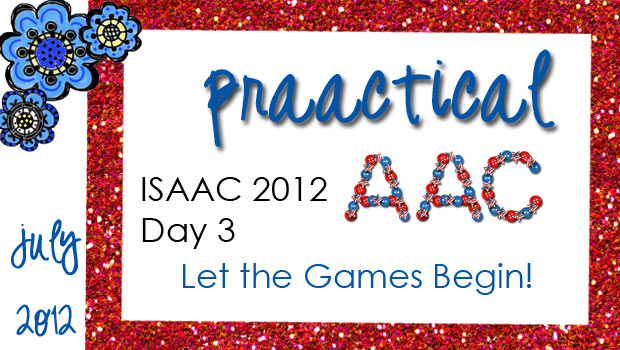
Today was the first day of the main conference and it did not disappoint. The conference began with a plenary session that was moving beyond words. For me, the highlight was Peter Yarrow, of Peter, Paul, and Mary fame joined in song by conference co-chair Katya Hill, and Snoopi Botten, who sings using AAC. Hearing the three of them sing songs like Puff the Magic Dragon and others made popular in the civil rights area did much to reinforce the notion that communication is a basic human right. The ongoing struggle to make that right accessible to all was highlighted in a speech by ISAAC president, Erna Alant, of South Africa, who rekindled our commitment to this effort. Another wonderful aspect of the plenary was the parade of nations, AAC style. Snoopi sang as the flags of the ISAAC members’ countries were displayed, and there were rousing cheers for all... [Read More...]
July 29, 2012
by Carole Zangari -
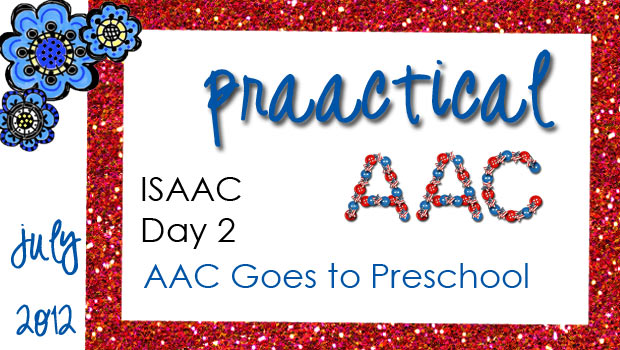
It was another wonderful day here in Pittsburgh at the 15th Biennial ISAAC Conference. It was a special day for me because I had the opportunity to speak about a really fun topic, core vocabulary teaching for young children with AAC needs. It was certainly a group effort! A talented graduate student of ours, Tathiane Paiva, and I shared a framework for developing a curriculum to teach core language in preschool classrooms, and used the curriculum I developed with Lori Wise (special educator and literacy specialist with UM NSU CARD) as an example. The basic principles behind the approach we shared are listed below. – •Language and literacy learning happen all day long. •Children learning AAC need high-quality instruction to learn and use basic vocabulary. •Children learning AAC need frequent opportunities for learning and practice. They need dozens of carefully planned opportunities to use their new words each day. •The focus is on... [Read More...]
July 20, 2012
by Robin Parker -
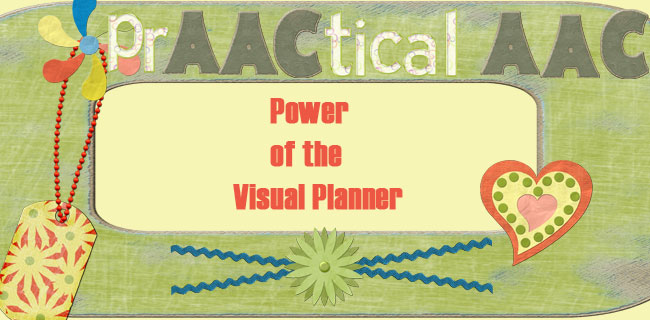
We need to continue to talk about scheduling…..especially as we talk about tools for positive behavioral supports. We know that having monthly, daily, and mini-schedules make us ALL feel more competent and calm. We have written a lot about visual schedules and visual schedule resources because we have seen schedules reduce or eliminate so many behavior challenges. They have helped with transitions, wandering away during activities, activity completion, asking repetitive ‘‘when are we going ________ questions, and with meltdowns during a less preferred activity. We also continue to write about schedules because there are still myths suggesting schedules might hinder independence when exactly the opposite is true. We personally continue to use a combination of no-tech to high-tech visual schedules, but we are loving mobile schedules especially during the summer when we are traveling and moving around from place to place even more frequently than usual. We gathered together... [Read More...]
July 14, 2012
by Carole Zangari -
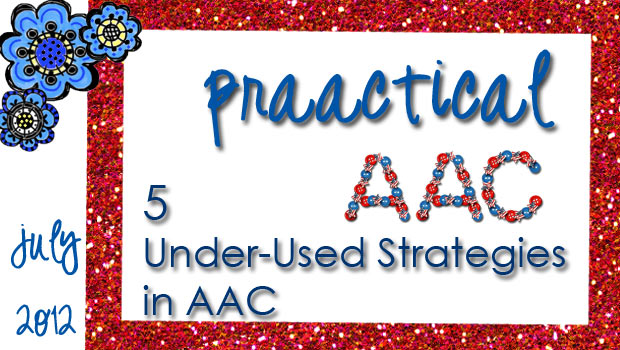
1. Partner-assisted scanning (PAS) offers great flexibility and spontaneity. Don’t want to take your SGD to the beach? A print-out of the screens and PAS is a great option. Missing key messages for the trip to the doctor’s office? A minute of brainstorming and the use of PAS may just save the day. No way for your client to access her device once she’s in bed? A communication board/book and PAS just might do the trick. – 2. Voice banking: For people are likely to lose their speech due to a degenerative disease, like ALS, the option of saving samples of their speech and having it digitized for future use seems to hold great appeal. We’d love to see more SLPs familiarize themselves with this strategy and the tools to implement it, so that this option is more widely used about individuals whose speech is deteriorating. – 3. Qualitative rating... [Read More...]
July 10, 2012
by Carole Zangari -
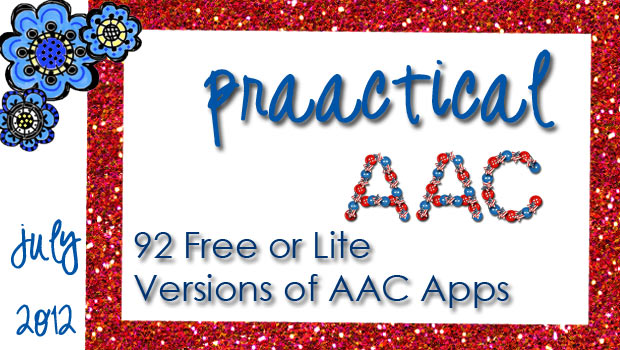
We’re back again with an updated list of free and lite versions of AAC apps that includes many additions for the Android platform. As in the past, we’re including some additional resources and excerpts from previous posts related to AAC app selection and the larger context of AAC assessment. We’ve appreciated the feedback on first draft of RELAAACs, our attempt to quantify some of what we look for when we try to compare AAC apps based on their language and communication features, and continue to welcome your suggestions. We do have plans to revise and update this once we get through the summer semester. (The trimester system is a killer!) —————————————————————————————————– – Thanks to all who’ve given us great feedback and suggestions on our list of free and lite AAC apps. If you’ve been following our blog, you know that we have mixed feelings about the AAC app revolution. More specifically, we’ve... [Read More...]
July 9, 2012
by Carole Zangari -
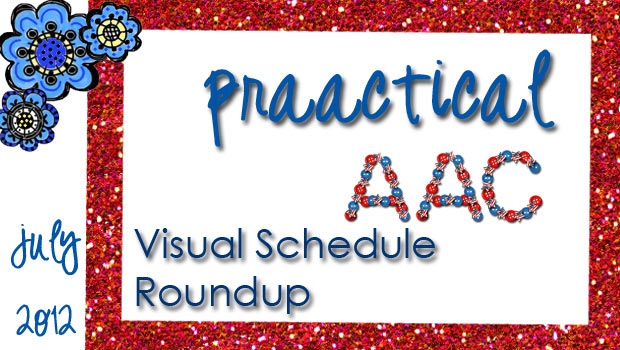
Summer is not the season we typically connect with routine, predictability, and structure. Nonetheless, if strategy really works to make someone’s life better, we try to use it whenever possible. Visual schedules work. They REALLY work. So whether you’re using them this summer or just preparing for the fall, we hope you enjoy this round-up of our past posts on Visual Schedules. – Riddle Me This (clinical rationale) Tech it Up’- 5 Visual Schedule Apps (tools) Visual Strategies 411 (implementation) PrAACtical Mini Schedules (implementation) Ideas for Teaching the Use of Visual Schedules (implementation) Object Schedules (video) Strategy of the Month: Types of Visual Schedules (implementation) Visual Schedules in Action (video) Building Complex Schedules (video) Schedule Changes (Video) AAC at Home: Visual Schedules and Supports Schedules and Choices (implementation) Visual Schedules & Inclusion (video) A Myth About Visual Schedule Lives On (implementation) Visual Schedule Wrap-Up (implementation + resource list) –
July 8, 2012
by Carole Zangari -
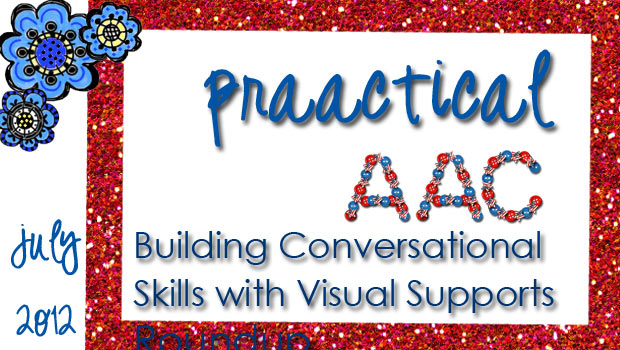
A young AAC user whom I know shared a story with me recently about feeling left out and struggling to find out why. Although she is smart, has age appropriate receptive language, and good command of her high tech SGD, building and maintaining friendships is a struggle. One of the things we’ll be doing to make changes in that area is to learn more about what makes a good conversation, adding vocabulary to make small talk easier, and practicing that. – Here’s a nice video, from Autism Teaching Strategies, that shows how to use visual supports and music to help learners remember to use some of the conversational continuers. Although Joel Shaul demonstrates this with visual supports that have words and phrases, the strategy works just as well with pictures for pre-literate communicators. – – Enjoy!









